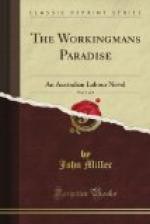“What do you call the Old Order?” asked Ned, lying back and looking up at the sky through the leaves.
“Everything that is inhuman, everything that is brutal, everything which relies upon the taking advantage of a fellow-man, which leads to the degradation of a woman or to the unhappiness of a child. Everything which is opposed to the idea of human brotherhood. That which produces scrofulous kings, and lying priests, and greasy millionaires, and powdered prostitutes, and ferret-faced thieves. That which makes the honest man a pauper and a beggar, and sets the clever swindler in parliament. That which makes you what you are at 24, a man without a home, with hardly a future. That which tries to condemn those who protest to starvation, and will yet condemn them to prison here in Australia as readily as ever it did in Europe or Russia.
“You want to know what makes this,” he went on. “Well, it is what we have been talking of, that you should have to ask another man for work so that you may live. It doesn’t matter what part of the world you are in or under what form of government, it is the same everywhere. So long as you can’t work without asking another man for permission you are exposed to all the ills that attend poverty and all the tyranny that attends inordinate power and luxury. When you grip that, you understand half the industrial problem.”
“And the other half, what’s that?” asked Ned.
“This, that we’ve got over the alluvial days, if they ever did exist industrially, and are in the thick of reefing fields and syndicates. So much machinery is necessary now that no ordinary single man can own the machinery he needs to work with as he could in the old pick and pannikin days. This makes him the slave of those who do own it for he has to work to live. Men must all join together to own the machinery they must have to work with, so that they may use it to produce what they need as they need it and will not have to starve unless some private owner of machinery can make a profit out of their labour. They must pull together as mates and work for what is best for all, not each man be trying only for himself and caring little whether others live or die. We must own all machinery co-operatively and work it co-operatively.”
“How about the land? Oughtn’t that to be owned by the people too?”
“Why, of course. The land is a part of the machinery of production. Henry George separates it but in reality it is simply one of the means by which we live, nowadays, for no man but an absolute savage can support himself on the bare land. In the free land days which Henry George quotes, the free old German days when we were all barbarians and didn’t know what a thief was, not only was the land held in common but the cattle also. Without its cattle a German tribe would have starved on the richest pastureland in Europe, and without our machinery we would starve were the land nationalised to-morrow.




